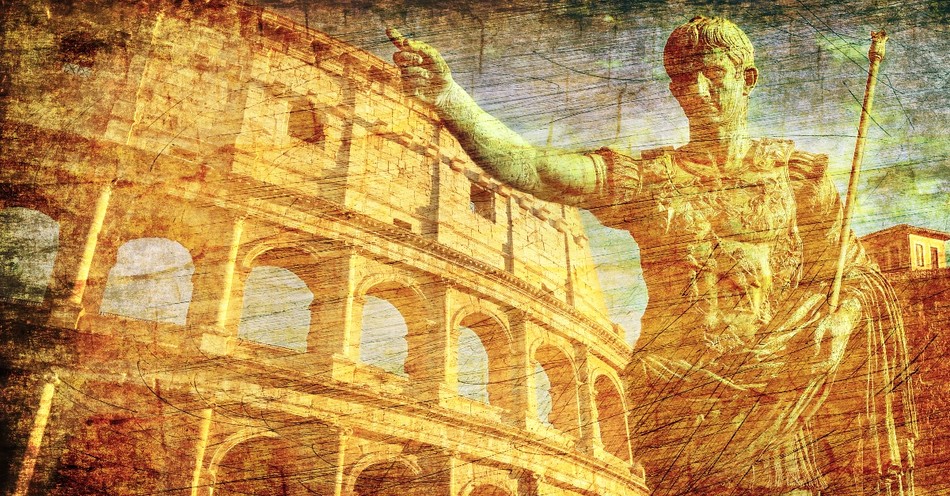It’s the early first century. A massive empire dominates the Mediterranean, stretching from Spain to Syria, France to Algeria and Egypt. Aqueducts, roads, and marvels of architecture joined with legions of soldiers, a far-reaching taxation and census system, a common language, and a complicated system of justice and government mark the most impressive empire the Mediterranean has ever seen.
In a backwater province on the edges of the empire, a poor wandering teacher from an obscure people group roams the countryside with a small band of followers, offering religious teachings like “love your enemy” and “do unto others as you would have them do unto you.”
Three years into His ministry, this teacher is brutally executed by representatives of the empire.
What made an enormous empire care about a quirky rabbi?
Nothing much, at first. But soon, the tables would turn.
Rome in the Time of Jesus
The days of the kings of Israel and Judah were long gone, with the last monarch of Judah blinded and carted off by Babylonian conquerors in 586 BC. Many of the Jews were taken into exile in Babylon. Some returned under an edict of King Cyrus of Persia in 538 BC that allowed them to rebuild Jerusalem, but Israel would remain under the rule of Persia, then Greece, then the Seleucids, with a brief period of relative freedom under the Maccabees before they were conquered by Rome in 63 BC.
Caesar Augustus was the self-chosen title of a man by the name of Octavian or Gaius Octavius. He was born in 63 BC and was adopted by his great uncle, Julius Caesar. Julius Caesar, dictator of Rome, famously attempted to set himself up as the supreme leader of the Roman Republic but was stabbed to death by the senators. Octavian took up Julius Caesar’s mantle at the age of only 18 and completed Rome’s transition once and for all from the Roman Republic to the Roman Empire.
Octavian was a brilliant statesman and military leader. He succeeded where Julius Caesar failed in slowly amassing his power and making himself out to be a leader for the people, calling himself the “first citizen.” By the time of Jesus, the Roman Empire was enjoying the “Pax Romana,” a time of unity, flourishing trade, and general peace and stability in the empire.
Augustus nearly doubled the size of Rome. His influence effectively stretched from Great Britain to India, and Italy, Greece, Spain, Gaul, North Africa, Egypt, Asia Minor, and the Near East and were all solidly part of the Roman Empire proper. Rome dominated everywhere that bordered on the Mediterranean and beyond.
Augustus ruled Rome from 27 BC to AD 14, before the birth and during the childhood of Jesus. Augustus was succeeded by Tiberius, who ruled until AD 37, during Jesus’ adulthood and death. Instead of embarking on major new campaigns of conquest, Tiberius strengthened the empire Augustus had built, solidifying Rome’s power and building its wealth.
By the time of Jesus, Israel was generally considered a backwater Roman province full of cantankerous people with strange religious beliefs. The Jews had very little autonomy, though they clung to their religion and customs.
Some Jews were Roman citizens (like the Apostle Paul) and thus had certain rights and privileges, but most were not. The Jewish people paid taxes to Rome and followed Roman laws. Local authorities, like Herod and Pontius Pilate, were put in place by Rome.
Jesus’ Threat to the Jews
As might be expected, another kooky, wandering religious teacher meant little to the Romans. Rome was more focused on stamping out rebel factions that kept cropping up in Palestine.
However, Jesus was seen as a major threat to the Jewish religious leaders. His seeming disregard for their religious laws was threatening enough, but this man went far beyond breaking social norms; He seemed to believe Himself to be God.
Actions like offering the forgiveness of sins (Matthew 9:2), claiming salvation came only from Him (John 14:6) and calling God His Father made the strictly monotheistic Jewish leaders livid.
John 5:18 records, “For this reason they tried all the more to kill him; not only was he breaking the Sabbath, but he was even calling God his own Father, making himself equal with God.”
Perhaps worst of all, people listened to Him. Thousands upon thousands came to be healed and hear Him teach. No matter how the religious leaders tried to trap Him with His own words, they failed. This blasphemous man needed to be stopped.
Jesus’ Threat to the Romans
Polytheistic Roman leaders didn’t care about what the Jews considered blasphemy. However, they took threats to Roman power seriously. Jesus was far from the only person gathering a following in Palestine during the first century, and Rome was more than happy to brutally put down any potential uprisings.
This Roman dedication to quelling uprisings was not without cause. A few decades after Jesus’ death, major uprisings took place in Judea, resulting in tens of thousands of deaths and the eventual destruction of the Temple in AD 70. The area was notoriously prone to rebellion.
Jesus had the dangerous ability to gather a crowd. Thousands at once came to hear Him speak. An especially poignant moment came when Jews from all over the world gathered in Jerusalem for the Passover celebration, filling the city with crowds.
When He rode into Jerusalem for the Passover — during which He would be betrayed and executed — the people shouted praises to Him, waved palm branches, and laid their cloaks on the road.
Though not bedecked with gold and the spoils of war, the procession was similar to the Roman Triumphs held for conquering Roman generals and emperors — a concerning sign that these people saw Jesus as a king (Matthew 21).
Jesus then promptly went into the Temple and flipped over the tables of the money changers and drove out all of the people who were buying and selling there, angrily declaring that they had turned His Father’s house into “a den of robbers” (Matthew 21:13). These people were quickly replaced by the blind and lame coming to Jesus for healing and children shouting, “Hosanna to the Son of David!” (Matthew 21:13-15). Jesus, as He often did, was causing a ruckus.
Gathering crowds, invoking kingship symbolism, causing a ruckus — the final nail in Jesus’ proverbial coffin was His claim of the title of Messiah, the awaited Anointed One who would save Israel. Most at the time understood this to be a military leader who would come to free Israel from Rome. And that was something Rome would never let happen.
More than the Romans feared rebellion, the Jewish leaders feared the Romans’ quelling of rebellions. Jesus threatened the very tenuous peace they held with Rome.
The Sanhedrin, the Jewish ruling body, called a meeting to figure out what to do about Jesus. “If we let him go on like this, everyone will believe in him, and then the Romans will come and take away both our temple and our nation” (John 11:48).
Thus, they decided that the best course of action was to arrest and kill Him.
The Jews and Romans Collaborate
The story of Jesus’ arrest and trial(s) can be found in Matthew chapters 26-27, Mark chapters 14-15, Luke chapters 22-23, and John chapters 18-19. One of Jesus’ disciples, Judas, betrayed Him to the Jewish authorities, who surrounded Him in the garden of Gethsemane and had Him arrested.
Jesus was first tried in front of the Jewish ruling council, the Sanhedrin, where He was found guilty of blasphemy, claiming to be the Son of God. For this, the Jews wished to put Him to death.
However, the Jewish leaders were not authorized to perform executions (John 18:31). Thus, Jesus was taken to the Roman governor of Judea, Pontius Pilate. Interestingly, though history has given Pilate a reputation as a ruthless and bloody ruler, the Bible records that he was hesitant to have Jesus killed, not finding fault with Him. However, the people called for Jesus’ death, so Pilate handed Him over to be crucified, the typical punishment for rebellious slaves and suspected revolutionaries.
Though Pilate may have been hesitant to have Jesus killed, the sign nailed to Jesus’ cross was surely a powerful statement about what happened to those who dared oppose Rome’s rule. “The King of the Jews” was written on a sign above Him, a clear indication exactly what sort of respect Rome had for any Jewish “king.”
The Christian Threat to Rome
If Jesus had stayed dead, the issue might have died there (pun intended). However, He, instead, came back to life and sparked a revolutionary new religion.
It wasn’t until Christianity came on the scene that Jesus truly threatened Rome. Christians interrupted the status quo with their insistence on one God, flying in the face of the Roman pantheon, including emperor worship, and the enormous economy built around the temples. Christians pledged themselves to someone they considered greater than the emperor.
Though much of the hatred for Christians came from misunderstandings (a common rumor was that Christians were cannibals, due to the practice of the Lord’s Supper), perhaps the suspicion and fear was not unfounded — within a few centuries, Christianity had spread throughout the Mediterranean, and the Roman Empire was no more, splintered into smaller entities.
Why Does This Matter?
At the time, Rome cared little about Jesus; He was just another potential revolutionary put to death. The Jews recognized more of just how powerful He was, but even they had no idea. None of them could have predicted that two thousand years later, the Temple would be but dust, the Roman Empire ancient history, but Jesus would be worshipped as Lord by billions around the world.
©iStock/Getty Images Plus/canbedone




